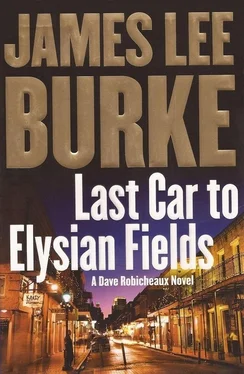He looked again at his notes. “A woman named Gretchen Peltier. But she quit before Ms. Flannigan starting seeing Bernstine.”
“What was that name again?”
I drove to the alarm company that had serviced Dr. Bernstine’s office. Like most alarm companies, it was an electronic shell that didn’t provide security but instead relayed distress signals to the fire department or a law enforcement agency. In other words, the chief expense of home security was passed on to the taxpayers and the alarm company was able to maintain its entire system, which monitored several parishes, with no more than a half dozen technicians and sales and clerical employees.
But the assistant director of the company, a black woman named Dauterive who had been an elementary school teacher, did her best to help me. A computer record of all electronic warning signals originating during the last year at Dr. Bernstine’s office was laid out on the desk. “See, there were a number of power failures. Those were either during an electrical storm or when a power line was knocked down. These other dates are the times the customer didn’t disarm the system fast enough. The dispatcher had to call and get the password.”
She was heavyset and wore glasses and a pink suit with a small corsage on the lapel. She glanced at her watch.
“Am I taking up too much time?” I asked.
“Oh, no. It’s my anniversary. My husband’s meeting me for lunch,” she replied.
“Who’s the dispatcher?”
“We use the Acadiana Ambulance Service. When they receive an emergency signal, they call the residence or the business and clear it up, or they notify the appropriate response service,” she replied.
“When was the last time you received an alarm that could have indicated an unauthorized entry?” I asked.
“Here,” she said, and tapped her finger on the computer printout. The date was one day after the gunshot death of the psychiatrist, Dr.
Bernstine. “But the dispatcher called and got the password.”
I ran my finger up the column on the printout to a billing notation for July and a description of services that amounted to two thousand dollars. “What’s this?” I asked.
“It looks like the customer changed out the system. If I remember correctly, a power surge fried the main panel and the customer decided to use the opportunity to upgrade.”
I was getting nowhere. “Let me think about this stuff and come back,” I said.
“I don’t know if this is of any help to you, but the customer changed his keypad code when he got his new system. See?” she said, and tapped the notation again.
“Yes?”
“He didn’t change his password. Sometimes people don’t like to change the password, particularly if it’s a pet name or part of a private joke in the family,” she said.
She looked me flatly in the face.
“That’s a hole in the dike, isn’t it?” I said.
“You might say that,” she replied.
“Did you say today was your anniversary?” I asked.
“That’s correct. Our twenty-seventh.”
“Have a great anniversary, Ms. Dauterive.”
I headed straight for Abbeville, twenty miles south on the Vermilion River, and the insurance company that employed Gretchen Peltier, the woman who had given Will Guillot his alibi for the night the drive-by daiquiri shop operator was murdered and who had also turned out to be a former employee of the slain psychiatrist.
She was terrified. Like most people who lead ordinary lives and stray across a line, usually in concert with someone far more devious than themselves, she could neither defend herself nor lie convincingly.
Instead, she began to perspire and swallow like someone in an elevator hearing steel cables snap a strand at a time.
“I don’t think you’re a bad person, Ms. Peltier. But you’re taking the weight for a bad guy,” I said.
“Taking the weight?” she said, more confused and frightened than ever now, her eyes flicking to the open door of her employer’s office.
“You’re about to take Will Guillot’s fall. That means you’ll go to prison. You’ll live behind razor wire and cell with murderers and sexual deviates of every stripe. Snitch one of them off and you get glass put in your food. That’s where Will Guillot has taken you.”
My rhetoric was cruel. She was a sad woman, her eyes etched with mascara, her clothes obviously bought at a discount store. I could only guess at the means of seduction Will Guillot had used to entice her into cooperating with the systematic destruction of her own life.
“I knew the code numbers to the alarm system in Dr. Bernstine’s office,” she said. “Dr. Bernstine had shot himself in the park. I gave the numbers to Will because he said his wife, the one he’s divorcing, told Dr. Bernstine a lot of lies that were going to be used in court against him. I gave him the password, too.”
“How did he get into the building?” I said.
“A man who works for him, an electrician, opened the door. But the numbers on the keypad had been changed. The alarm went off. If Will hadn’t had the password, the cops would have come out.”
Her eyes were wet. She rested her forehead on the heel of her hand.
“You told me Guillot was with you the night the daiquiri store operator was killed. Was that a lie?”
“No.”
“You sure?” I said, looking down into her face.
“I thought I was helping Will. Why have you done this to me?” she replied. She found a handkerchief in her purse and pressed it against her eyes.
“What’s going on out here?” her employer said, standing in the doorway of his office, his tie printed with hundreds of tiny blue stars against a red background, a small American flag pinned on the lapel of his suit.
I walked to my cruiser, which was parked on Abbeville’s town square. The sun was already deep in the west, the light thin and brittle on the old brick cathedral in the square and the cemetery behind it, where the bodies of Confederate dead from Shiloh and Port Hudson lay in crypts stained with lichen and split with fissures, as though the earth were determined to absorb them and their contents back into itself. I could hear traffic crossing the steel bridge over the Vermilion River and smell the odors of diesel oil and water and shrimp husks piled behind a restaurant, and as I looked at the bare limbs of the willows along the river I was suddenly filled with the sense the sun was not simply completing part of its cycle across the sky, it was about to descend over the rim of the earth for the last time.
In psychoanalysis it’s called a world destruction fantasy.
Were my irrational feelings connected to the fact I had just helped dismantle a woman’s life? Or were the rats’ nests of rags and bones in those crypts reminders that Shiloh was not a grand moment in history, but a three-day meat-cutter that soaked the hills with the blood of farm boys most of whom never owned a slave or knew anything about the economics of northern textile mills? Or was the sum total of my own life finally being made apparent to me?
The streets were almost empty, swirling with dust and pieces of newspaper, the water oaks bare of leaves, many of the old stores permanently closed. The world in which I had grown up was gone. I wanted to pretend otherwise, to find excuses for the decay, the strip malls, the trash strewn along the roadways, the century-old live oaks that developers lopped into stumps with almost patriotic pride. In my vanity I wanted to believe that I and others could turn it around. But it was not going to happen, not in my lifetime nor in my child’s.
It was 4:45 when I got back to the department and rain had begun falling in big fat drops on the sidewalk that led into the courthouse.
I pulled my mail out of my pigeon hole and went into my office. A few minutes later Helen came in.
Читать дальше












